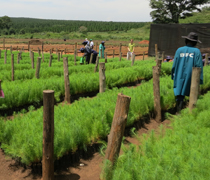Bringing forest cultivation work to rural Africa
Africa contains many regions suitable for forest cultivation but still has very few well-managed plantation forests.

A pioneer in this field is Green Resources AS, established by Mads Asprem of Norway. GRAS has been planting forests in Tanzania, Uganda and Mozambique since the mid-1990s.
One of its strategies is long-term leasing of land from local communities. Forest management provides work and income for the rural poor. GRAS trains employees and thus transfers skills to the local community. In the three main countries where it operates it employs a total of about 4000 workers. If family members and indirect jobs are taken into account, it can be said that GRAS provides a large part of the livelihood of several tens of thousands of people.
It also participates in the development of local infrastructure, repairing roads and building schools, health centres and wells.
Combat against deforestation
Sustainably managed plantations provide raw materials that would otherwise come from natural forests. This is a way of helping combat the advancing deforestation of Africa. In the areas managed by GRAS, alongside plantation forests, are natural forests, which it supervises to prevent illegal felling and forest fires. It supplies wood to local markets and intends to begin exports in the longer term. The growth markets of Asia are particularly interested.
Transmission poles and charcoal
In Tanzania and Uganda GRAS produces transmission poles and charcoal for local and East African markets. There are environmental reasons for increasing the use of charcoal from plantation forests because the charcoal is mainly produced by destroying natural forests. Charcoal is the most common fuel used by poor households for preparing food.
Norway’s development finance institution Norfund and the International Finance Corporation of the World Bank group have provided finance for GRAS. Finnfund has granted the company an investment loan. The participation of development finance institutions is important during the company’s expansion because it would be difficult to obtain finance from purely commercial sources. Alongside the investments by Finnfund and Norfund, the company’s current shareholders have also increased their capital investment in GRAS.

